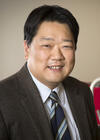In The News: Department of Mechanical Engineering

UNLV engineering student Truc Tran stood next to a robot Monday just before turning on its power.

A team from UNLV’s engineering lab is set to compete for $10 million. The ANA Avatar XPRIZE competition will take place in Long Beach, California from Nov. 4 to 5. The competition sees teams from around the globe showcase the latest in technological developments intended to benefit humanity.

UNLV researchers are part of a team that will receive almost three million dollars of federal funding for a project focused on the workforce for nuclear energy.
Kristen Tagaytayan carefully unearthed her research sample from a nitrogen glovebox. She gingerly placed the sample onto her workspace and added a nickel chemical solution to it. Using a razor blade, she evened out the mixture across a glass slide and placed it in the lab's oven, where she watched it cook from behind the glass window.
On June 3, the SpaceX CRS-22 rocket took off for the International Space Station-bound from Cape Canaveral, Florida. On board was unusual cargo: oral bacteria and saliva.

The future is being assembled piece by piece at UNLV. A human-like robot developed by engineering students is attracting worldwide attention.
ANS is hosting a virtual Graduate School Fair on Friday, November 19, from 3:30 p.m. to 6:30 p.m. (EST). The goal of the event is to help prepare the next generation of nuclear professionals and to keep early career and seasoned experts at the top of their game.
A UConn Health researcher has won a federal grant to develop respirator masks that could help mitigate the spread of airborne illnesses like COVID-19.
Last June, NASA's SpaceX Dragon space rocket took off from Florida with, among other scientific experiments, 30 saliva samples that will be part of a dental experiment.
It is the first dental study to be performed in zero gravity, and sponsored by the National Laboratory of the International Space Station in the United States, in collaboration with NASA and Colgate Palmolive.
As the saying goes, the sky is the limit. This is true for scientists conducting the first oral health experiment in space to investigate the growth and response of oral bacteria to treatment agents in zero gravity.



